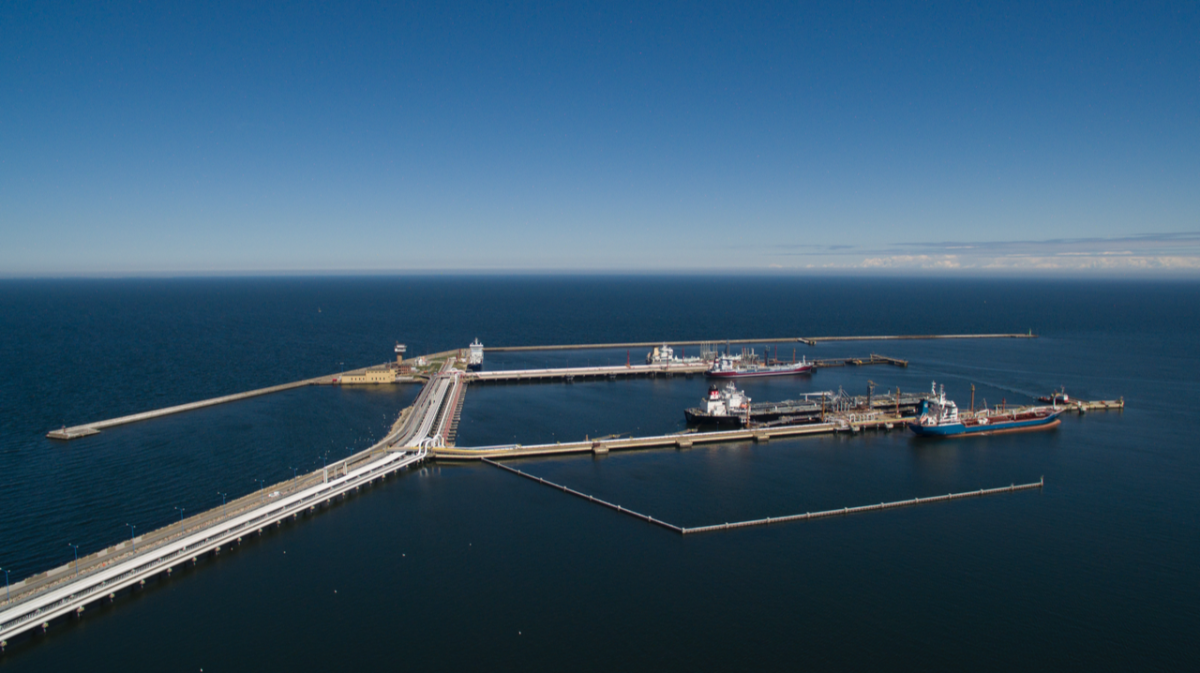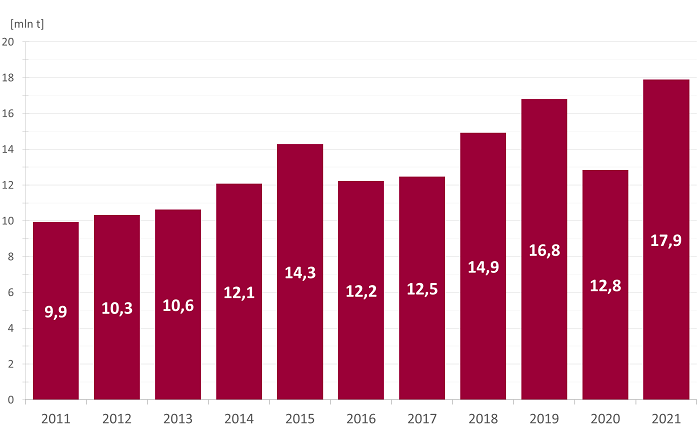
An increase of over 6 percent compared to the record-breaking 2019 was recorded by Naftoport from the PERN Group. Company handled nearly 18 million tonnes of crude oil and fuels in 2021.
As PERN emphasizes, Naftoport is
currently a key company that ensures the diversification of crude oil
supplies to Poland. Naftoport is a company from Gdańsk, the only sea
crude oil transshipment terminal in Poland, one of the largest and
most universal terminal for handling refined products, and also one
of the largest transshipment terminals in the Baltic Sea.
Despite the ongoing pandemic, 2021
was marked by growth for the global economy.
- The trend was
similar with us - says Andrzej Brzózka, President of the Management
Board of Naftoport, in an interview with GospodarkaMorska.pl. - Let
me remind you that Naftoport's result in 2020 was sixth in terms of
volume, which means that it was also good, but it was a clear
correction compared to the three previous growth years.
President of Naftoport: "Back
with a bang"
President Brzózka called the year
2021 „back with a bang", and the „bang” was exactly 17.9
million tons of cargo.
- We achieved a surplus result,
breaking the transhipment records by over a million tons from 2019
(16.8 million tons) - he reminds.
It is worth mentioning that it was
in 2019 that Naftoport operated "at maximum speed due to the
chloride crisis", which for 46 days stopped pumping the raw
material through the "Przyjaźń" pipeline - it was about
chlorides detected in crude oil transported via the main line to
Poland from Russia, transit through Belarus .
- These are the results of the
economic recovery that rose from the economic shock after 2020. This
is the result of customer demand, as well as the mix of the
diversification policy that has been maintained for several years,
and the market situation - explains the president of Naftoport, which
in recent years has become mainly a raw material port for crude oil.
- This increase is due to increases
in crude oil transshipment in the relation of imports for domestic
needs and in complementary transit to two refineries in Germany - he
says.

- We carry out reloading of fuels
for entities connected to the fuel infrastructure of the Lotos Group
refinery. These transhipments are currently lower, which results from
the market situation - high demand for fuels on the domestic market.
Andrzej Brzózka also referred to
the merger with Lotos. - As far as Naftoport is concerned, the impact
of the merger may be at least neutral, but it will rather translate
into a definite plus, due to the expected increase in the volumes of
the raw material supplied by sea, he explains. - And it should be
noted that the transhipment of liquid fuels in all Polish ports last
year already amounted to a record 27 million tonnes (including LPG
and LNG), of which Naftoport handled 67%. The company also performed
13% of transhipments of the total cargo weight in Polish ports in
2021.
Crude oil flows to Poland by sea
- via the Gdansk's Naftoport
According to President Brzózka, on
the basis of data up to November 2021, Poland's demand for oil
delivered by sea - mainly from directions other than the east -
amounted to almost two-thirds.
- Less than seven years ago, this
result was 25 percent - he reminds. - We crossed the barrier of 50
percent of our share in the volume of gas supplies in 2019. And this
level is clearly increasing, which means that the amount of crude oil
transported by sea is increasing.
According to PERN, in the last two
years the company "radically increased the storage capacity
dedicated to crude oil on the coast.
One cannot forget about the
extensive resource base in Gdańsk and the completed second stage of
the expansion of the local Oil Terminal, which increased PERN's
storage potential by almost 600 thousand square meters.
The transhipment potential of Naftoport
After analyzing the increases in
transhipment and the company's capabilities, it can be said that it
is able to cover up to 100 percent of Poland's demand for oil. - And
to carry out additional foreign contracts - says the president. - A
lot depends on the land system, the combination of land capacity with
species diversity. It's about the separation of oil types.
Recent investments have
significantly improved throughput. We are talking about the expansion
of the nearby TNG terminal and the PERN base in Górki - this
increased the capacity by over 0.5 million tons.
- The system is becoming more and
more efficient, it was shown in 2019. The situation is at least good
- believes the president.
The president adds that the works
that Naftoport is planning are modernizations. The company is not
planning any spectacular investments in the near future. - The
current infrastructure has enough potential - he says. - Currently,
the most important thing is maintenance and business continuity. This
is what renovation and modernization works are aimed at. Anyway,
we've been successful in it for years. We have no downtime. We intend
to maintain this in all traffic conditions, although in the case of
such large reloads, it is not an easy task. Our honesty and
reliability make our clients trust us more and more. The stability of
deliveries by sea is of great importance - says the president of
Naftoport.
When it comes to traffic volume,
paradoxically, as the president pointed out, in 2015 Naftoport
handled 367 tankers (which translated into 14.3 million tons of
cargo). In 2021, however, 266 ships delivered 17.9 million tons of
cargo weight.
- Larger and larger ships are
coming to us - says Brzózka. - In 2015, 33 percent of ships were oil
carriers, which are units several times larger than product tankers,
and now this result has increased to 67%.
As he pointed out, Naftoport can be
entered by vessels with a length of more than 300 meters and a draft
of 15 meters, and customers have five reloading stations at their
disposal.
PERN emphasizes that Naftoport has
the capacity to tranship over 36 million tonnes of crude oil and 4
million tonnes of petroleum products per year, thus ensuring the
ability to fully cover the needs of refineries connected to the PERN
pipeline system.
The company also explained that in
the sea terminal of Naftoport there are reloading of crude oil,
gasoline and diesel oil, as well as aviation fuel, heating oil,
condensates and components.
PERN is a state-owned entity,
strategic for Poland's energy security, managing, inter alia, in
country by pipelines pumping crude oil to the PKN Orlen refinery in
Płock and the Lotos Group in Gdańsk, as well as to two refineries
in Germany and having raw material and fuel storage facilities.
Recently, PERN reported that the
capacity of its crude oil bases is now 4.1 million cubic meters. -
the raw material is stored in 75 tanks, and the length of pipelines
for its transport is 1,845 km, while in the case of fuel depots, the
company has 315 tanks with a total capacity of 2.1 million cubic
meters, and the length of product lines is 616 km.


